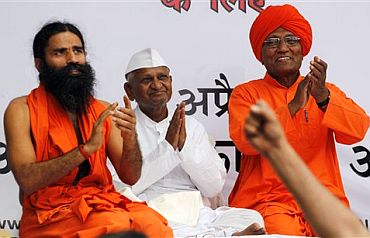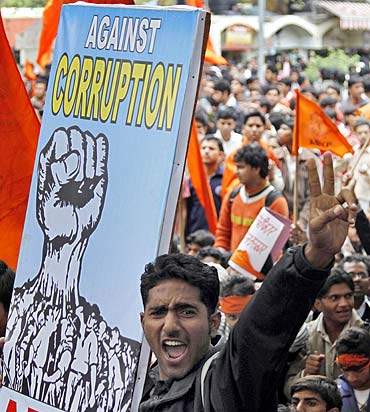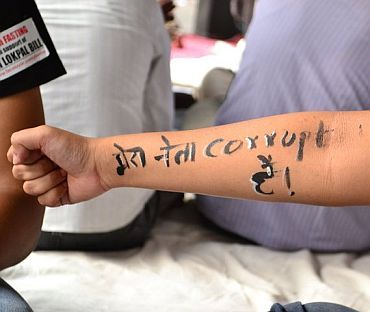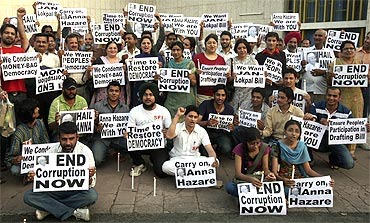
The much-awaited and debated Lokpal Bill was finally introduced in the Parliament on Thursday. While Anna Hazare and team burnt copies of the bill calling it 'anti-poor', 'anti-Dalit', the Bharatiya Janata Party raised several objections to the proposed bill, mainly objecting to exclusion of prime minister from the purview of the proposed legislation.
Though the bill has been debated extensively in the media, many continue to be unaware of what the bill is all about. For a better understanding of the Lokpal bill, here are answers to some frequently asked questions.
What is the purpose of the Lokpal bill?
The bill seeks to establish an institution that will inquire into allegations of corruption against certain public functionaries. It establishes the office of the Lokpal for this purpose.
What is the composition of the Lokpal?
The Lokpal shall consist of a chairperson and up to eight members. The chairperson and at least half of the members have to be current or former judges of the Supreme Court or chief justices of high courts. The other members will have at least 25 years experience in matters related to anti-corruption policy, vigilance, public administration, finance, law and management.
...

Who selects the Lokpal?
The selection committee consists of the prime minister, Lok Sabha speaker, the leader of opposition in each house of Parliament, a union cabinet minister, a sitting Supreme Court judge, a sitting high court chief justice, an eminent jurist, a person of eminence in public life. The two judges on this committee will be nominated by the chief justice of India.
Who comes under the jurisdiction of the Lokpal?
There are seven categories of persons under the Lokpal: (a) prime minister after demitting office; (b) current and former ministers; (c) current and former members of Parliament (d) all Group A officers of the central government; (e) all Group A equivalent officers or public sector undertakings and other government bodies; (f) directors and officers of non-governmental organisations that receive government financing; (g) directors and officers of non-governmental organisations that receive funds from the public, and have annual income above a level to be notified by the government. The speech and vote of members of Parliament in Parliament are exempt from the purview of the Lokpal.
What are the major powers of the Lokpal?
The Lokpal has two major wings: investigation wing and prosecution wing. The Lokpal can ask the investigation wing to conduct preliminary investigation of any offence alleged to be committed under the Prevention of Corruption Act, 1988. It can then conduct an inquiry. If the inquiry concludes that an offence was committed, the Lokpal can recommend disciplinary action. It can also file a case in the special court.
...

Does the Lokpal need any prior sanction to initiate any action?
No. The bill states that the Lokpal does not need prior sanction to inquire into an offence, or to initiate prosecution in the special court.
What are special courts under this bill?
The central government is required to constitute special courts to hear and decide cases under this bill. The Lokpal shall recommend the number of such courts.
What are the various time limits for conducting inquiry and trial?
All preliminary investigation or inquiry must be completed within 30 days of the complaints (and can be extended for a further three months, with written reasons). The inquiry is to be completed within six months (extendable by six months). The trial is to be completed within one year of filing the case. This time may be extended by three months (and in further periods of three months each time) with written reasons, but the total time should not exceed two years.
...

How can the Lokpal be removed from office?
The President may make a reference to the Supreme Court, (a) either on his own, or (b) if 100 members of Parliament sign a petition, or (c) if a citizen makes a petition and the President is satisfied that it should be referred. If the Supreme Court, after an inquiry, finds the charge of misbehaviour was valid against the chairperson or a member and recommends removal, he shall be removed by the President.
What are the provisions for the expenses of the Lokpal?
The bill provides that all expenses will be charged, i.e., the amount will be provided without requiring a vote in Parliament. The bill estimates recurring expenditure of Rs 100 crore per annum, and a non-recurring expenditure of Rs 50 crore. It also estimates a further Rs 400 crore for a building.
What are the major differences from the Jan Lokpal bill drafted by team Anna?
There are several differences. The composition of the Lokpal and the selection process are different; the Jan Lokpal draft included a search committee with civil society members to shortlist the eligible members of the Lokpal.
The Lokpal had jurisdiction over the prime minister, the judiciary and all public servants (only Group A officers in the government bill); it included the speech and vote of MPs in Parliament; it did not include NGOs. The Jan Lokpal bill provided that the investigation and prosecution wings of the Central Bureau of Investigation shall report to the Lokpal for corruption cases.
It also had penalties ranging from six months to life imprisonment (under the government bill, the maximum imprisonment is derived from the Prevention of Corruption Act, 1988, and is 7 years).